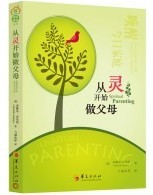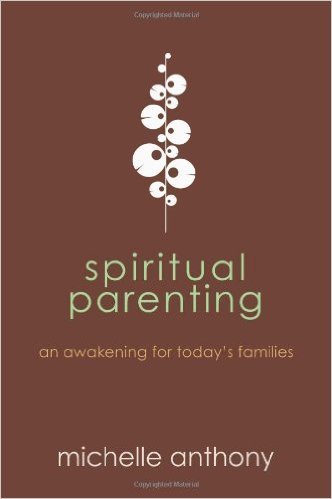

 字體:小 中 大
字體:小 中 大 |
|
|
|
| 2016/11/07 16:01:55瀏覽1323|回應4|推薦50 | |
這學期修的兩門課之一是“亞美事工”,教授是蘇炳甘牧師。蘇牧師是富勒神學院教牧學博士、利伯蒂大學輔導諮商學博士,曾任基督教會主任牧師、夏威夷宣道會主任牧師、播道會港福堂主任牧師、洛杉磯台福教會英語牧師及實踐神學副教授兼教牧學博士科主任。 亞美事工這門課是探討華人教會第二代事工,老師透過生動的教學法,用講述,影片,討論,分享等帶出第二代華裔ABC的事工問題與發展策略。華裔第二代,生活在美國社會中,不少人有看不見的「玻璃天花板」障礙,對自我身份產生徘徊,外黃內白,覺得不容易融於美國主流社會,也很難被華裔社會認同。 第二代華裔去教會者少於2%,有很多現象值得關注與探討,如離開華人教會的原因?很少華裔青年在大學畢業後回到以前的教會?英文堂牧師何故離開華人教會?華語主任牧師如何幫助華裔第二代成長?…等等。透過蘇牧師的教導與分享,大家熱烈熱烈,獲益匪淺。 蘇老師的這門課作業不少,包括好幾篇報告及期末考。前幾天老師將學期初交上去的作業發下來,這個作業是讀書報告,書名是 "Spiritual Parenting" 作者是 Michelle Anthony。這是一本非常值得一讀的書,剛剛上網找這本書的封面圖片,發現本書已經翻譯成中文。書名爲: "從靈開始作父母"。將讀書報告PO在這裏,有興趣的格友可以買這本書來看,
Book Review: Spiritual Parenting by Michelle Anthony I was fascinated by just reading the first paragraph of this book “Spiritual Parenting” written by Michelle Anthony. Within less than five minutes, I felt this book was written for me. The author said “I wanted my mother and mother-in law think I was cutting it with their grandchildren. I wanted my church members think I’m a good mother. I even care what the grocery clerk – a perfect stranger- thought of me as a parent” (p.11). What the author described is exactly like me, who was always caring about how I raised my kids. I wanted to do a good job raising my children and be a perfect mom. I wanted people to look at my kids in amazement and think “Wow, what a magnificent mother”. The main points the author made in the book are that “Spiritual parenting is parenting from a spiritual perspective with eternity in mind. It’s to parent the child or children that God gave me in such a way that I first honor God, and then second, create the best environment to put my children in the path of the Divine”(p.12). To teach the parents how to put the concept above into practice, the author listed ten distinct environments that the parent can create in their homes to build spiritual spaces so to transform children into God’s likeness. There are twelve chapters in this book and she dedicated one chapter to each environment including Storytelling, Identity, Faith Community, Service, Out of Comfort Zone, Responsibility, Course Correction, Love & Respect, Knowing and Modeling (pp.39-41). I have three children and they are all grown up. Thank God, with his blessing and my efforts of constantly thinking about being a perfect mom, my three children are, in people’s eyes, kind of successful. My daughter was graduated from Stanford University, my older son is a medical doctor and my younger son is in the 3rd year of medical school. I also have a one-year old grandson. Reading through this book reminds me ofl what I have done in the past. When I found something the author mentioned that I already followed, I felt so happy and fortunate. When I found something that I missed in the past, I felt regret and wished I could have done that. However, I know it’s never too late to pass the teaching from this book to my daughter-in-law, my daughter, my sons or my future son-in-law so they can learn to be spiritual parents. In fact, I think I can still apply these ideas to my grown-up kids or my grandchildren when I have opportunity to be with them. After all, it’s a life-long learning process. There are lots of great points in this book and they are all very persuasive information such as “Storytelling is a compelling way to shape an other-centered and God-centered worldview in children’s hearts so they don’t merely look out for their own personal interests, but also for the interests of others” (p.45). For identity, “A Christian girl shouldn’t feel the pain of guilt but the freedom of truth. She has her priorities in check, God first and others follow behind” (p.71). For Faith Community, “the faith community offers a support system among people are like-minded, who believe the same truths, and who ultimately want the same things out of this life” (p.82). I think what the author said about storytelling is very true. By telling our children other people’s story or put them into the role play can expand their mind to look at things from other’s point of view. By telling about God’s story can allow our kids to feel the awe of being part of something way bigger than them. Ultimately this can create a hunger for more and validate what we are teaching them” (p.56). The problem with many tragedies in human history was that people try to control other people. Examples are like Germany Hitler or China Mao. If we constantly tell our children the wonderful mystery of who God is and how he chose a part for each of us to play, then they rest in the knowledge that we were never created to be the same and they will be free to be who they were created to be (p.62). I also can’t agree more with the author how important the faith community is to kids. My children benefit a lot from growing up in a church where many of them have known each other since they were born. They have been supporting and talking with each other even today when they are all out of colleges. A faith community can help our children to have identity. The most interesting and meaningful point to me in this book is that the author said her mom had special ability to make her feel known. She was aware of the smallest nuances of what happening in her life and she let her know she cared (pp. 187-188). These statements made me feel sad because I have been trying to make my daughter feel known, but it seems that it didn’t quite succeed especially after she left home for college. I think I should have taught her that no one knows her better than God and no one loves her more either. Thus, she should feel good even though she feels she is not known fully by the people surrounding her. One contradiction that I can see in this book is about service. The author encouraged us to train our children to serve other people, to always ask “what needs to be done?” and not just taking care of self (p.102). Don’t get me wrong. I don’t mean that this point is no good, but it just reminds me of some sad stories happened among my friends. Some of my friends’ marriage broke because their husbands only thought about serving other people or community and didn’t have time to help their own families. There are only certain time and energy the each one own and it’s hard to take care of everything. I believe the concept of service is great, but we also need to teach kids the priority in their lives. This book reminds me of another book named “The purpose Driven Life”. The Author Rick Warren stated that knowing purpose can gives us meaning of life, make us simplify life, focus, motivate and prepare for eternity. The only thing that matters is if we love Jesus and use all our gifts, talents, opportunities, energy, relationships and resources for the life purposes God gave us (Warren, R. 2002, p.33-34). There are connections and parallels between these two books because both authors believe that knowing identity, knowing God is the most important driver for children to change their behaviors. The spiritual parenting in this book is in contradiction to the teaching presented in another book “Battle Hymn of Tiger Mother” where the author forced her daughter to play piano which made her punched, trashed, kicked and grabbed the music score and tore it to shreds (Chua, A. 2011, p.60-61). One is to motivate the child to do things voluntarily; the other is to make the them surrender unwillingly. The question this book raises to me is that why some pastor’s children are not as good as expected even though the parents are very spiritual? Does it also depend on the gen just like even from the same spiritual parents, siblings are very often different? In summary, I agree with most of what the author stated in this book especially about storytelling, identity, faith community and knowing. And I think we should teach our children to be willing to help and serve other people, but not beyond their capability. They have to know how to take their own responsibilities before providing services to other people. In our church, there are many Sunday school students and youths who are the English speaking 2nd generation. While reading this book, their faces constantly come through my mind. I feel that we have lots of room for improvements in the spiritual teaching at home and at church. I think I would suggest during our next deacon meeting to have some training session to teach Sunday School teachers how to understand the young generation more and to be able to use some of the ways indicated in this book to create spiritual environments so to transform our children into God’s likeness. |
|
| ( 創作|散文 ) |










